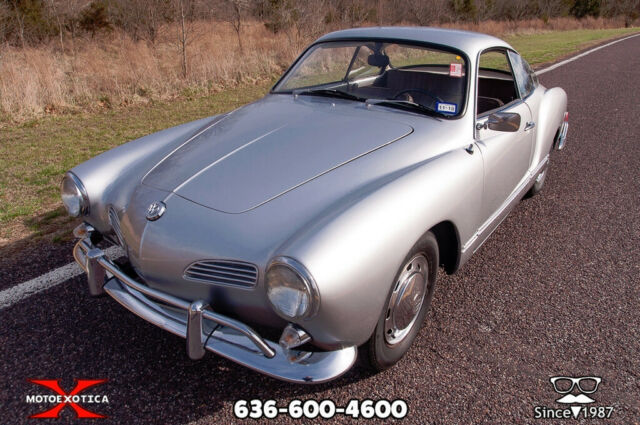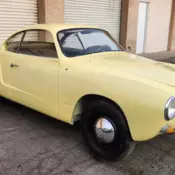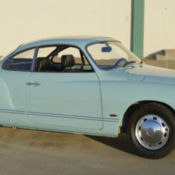1969 Volkswagen Karmann Ghia Coupe 2+2
1969 Volkswagen Karmann Ghia Coupe 2+2
1969 Volkswagen Karmann Ghia Coupe 2+2
Silver exterior with brown vinyl interior1.5L air-cooled flat four-cylinder engineFour-speed manual transmissionFront disc and rear drum brakesFull independent suspensionLooking for a classic VW that is not a Beetle? MotoeXotica Classic Cars may have the answer with this 1969 Karmann Ghia 2+2, (Model 143) a stylish alternative to the more pedestrian Type 1. Finished in silver and made in Osnabrück, West Germany, this Lowlight's paint and trim are in very good order.
The 2+2 exhibits straight and nice body, the engine bay is very tidy and the chrome bumpers are in good, original order.
This Vee-Dub rolls on Kumho radials, size 165/80R15 at all four corners. Each one is mounted on steel wheels topped by factory vented alloy wheel covers. The wheels and tires are in overall very good order.
In back is a 1.5L air-cooled, flat four-cylinder engine buttoned to a four-speed manual transmission. Driver convenience features include front disc brakes and fully independent suspension.
Inside, the car's seats are in very good order while the neutral carpet is in great condition. The contrasting white headliner offers some air to the cabin and is in overall excellent condition. The original, two-spoke steering wheel is in place and looks great. The instrument panel, with its woodgrain appliqué for added warmth and matching wood shift knob, and inner door panels are all in very good condition, too. The horn is inoperable and part of the antenna is missing. Completing the interior is a Pioneer AM/FM stereo with a CD player.
The Volkswagen Karmann Ghia is a sports car marketed in 2+2 coupe (1955-1974) and 2+2 convertible (1957-1974) body styles by Volkswagen. Internally designated the Type 14, the Karmann Ghia combined the chassis and mechanicals of the Type 1 (Beetle) with styling by Italy's Carrozzeria Ghia and hand-built bodywork by German coachbuilding house, Karmann. More than 445,000 Karmann Ghias were produced in Germany over the car's production life, not including the Type 34 variant.
Long noted for its exterior styling, the Karmann Ghia was designed with input from numerous individuals at Carrozzeria Ghia and was strongly influenced by Virgil Exner's work, though all of its designers passed without a definitive individual styling attribution.
American industrial designer Walter Dorwin Teague included the Karmann Ghia in his list of the world's most beautifully designed products.
Three companies and numerous individuals came together in the history of the Karmann Ghia. In the early 1950s, Volkswagen was producing its Volkswagen Beetle, and as postwar standards of living increased, executives at Volkswagen were at least receptive adding a halo model to its range, if not proactive. Luigi Segre was committed to expanding the international reputation of Carrozzeria Ghia. And Wilhelm Karmann had taken over his family coachbuilding firm Karmann and was eager to augment his contracts building Volkswagen's convertible models.
Wilhelm Karmann and Luigi Segre often encountered each other at international automobile shows, and after an initial discussion prompted by Wilhelm Karmann, Segre secretly obtained a Volkswagen Beetle to use as a basis for a prototype — the Type I's were difficult to come by and Gian Paolo, Maoro Boano's son, purchased one in Paris and drove it back to Turin. Ghia customized its platform, designed the initial prototype and in five months constructed the model. Segre secretly presented the model to Wilhelm Karmann one year after the initial discussion — late in 1953, in Paris, at the Société France Motors factories (Volkswagen's dealership for France and the exclusive European dealer of Ghia-bult Chrysler models). When Wilhelm Karmann saw the coupe, Karmann he said, "I'd like to build that!" As the head of Ghia, Segre singularly directed the project through conception and prototyping, delivering a feasible project that Willhelm Karmann both wanted to and could practically build — the project Willhelm Karmann would in turn present to Volkswagen.
The styling of the vehicle, however, integrated work by Segre as well as Mario Boano, Sergio Coggiola and Giovanni Savonuzzi — and at various times they each took credit for the design. Furthermore, the design bore striking styling similarities to Virgil Exner's Chrysler d'Elegance and K-310 concepts, which Ghia had been tasked with prototyping — and which in turn reflected numerous cues and themes developed previously by Mario Boano. According to Virgil Exner's son, Virgil M. Exner Jr., Giovanni Savonuzzi was tasked with scaling down the full-sized d'Elegance, replacing "the Chrysler's egg-crate grille with a gentle, boat-like prow." Exner Jr. is further quoted as saying that the Karmann Ghia "was a direct, intentional swipe off the Chrysler d'Elegance. Givanni Savonuzzi was the engineer and designer who downsized the d'Elegance and made the Karmann Ghia out of it. Nobody minded it. It was wonderful.â€
The precise styling responsibilities were not well-documented at the time, before the passing of the various designers, further complicated by the overlapping work of the key players. A definitive individual attribution on Karmann Ghia's styling was never made.
Segre and Virgil Exner became close professionally and personally, eventually traveling Europe together. Peter Grist wrote in his 2007 Exner biography that when Exner in 1955 eventually saw the Karmann Ghia, which cribbed heavily from his Chrysler d'Elegance, "he was pleased with the outcome and glad that one of his designs had made it into large-scale production." Chris Voss, a stylist in Exner's office, reported in 1993, that Exner considered the Karmann Ghia the ultimate form of flattery. Segre in turn sent Exner the first production Karmann Ghia imported into the state of Michigan, in gratitude.
After Volkswagen approved the design in November 1953, the Karmann Ghia debuted (at the 1955 Paris and Frankfurt auto shows and at the Kasino Hotel in Westfalia, Germany, on July 14, 1955) and went into production, first at Ghia and then in Osnabrück — ultimately to reach a production over 445,000, running 19 years virtually unchanged.
Competition to this Lowlight in 1969 included Chevrolet's Corvair, and new-for'70 Vega, Ford's Maverick, Nissan's new-for-1970 240Z and Opel's GT.
Tipping the scale at just over 1,850 pounds, this wee German gem is primed to fling around corners while putting a smile on your face as you snick through the gears, so come by MotoeXotica Classic Cars today to check it out for yourself.
VIN: 149575989
This car is currently located at our facility in St. Louis, Missouri. Current mileage on the odometer shows 27,827 miles. It is sold as is, where is, on a clean and clear, mileage exempt title. GET OUT AND DRIVE!!!
Note: Please see full terms and conditions listed below that pertain to the purchase of any said vehicle, thank you.
Please Copy & Paste the Link Below to View Our YouTube Video:
https://youtu.be/W5usYMiB2q8
- Make: Volkswagen
- Model: Karmann Ghia
- SubModel: Karmann Ghia Coupe 2+2
- Type: Coupe
- Trim: Coupe 2+2
- Doors: 2 Doors
- Year: 1969
- Mileage: 27827
- VIN: 149575989
- Color: Silver
- Engine size: 1.5L air-cooled flat four-cylinder
- Number of cylinders: 4
- Transmission: Manual
- Drive type: RWD
- Interior color: Brown
- Vehicle Title: Clear Want to buy? Contact seller!





















